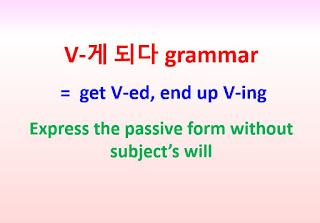หัวข้อ : V-게 되다 grammar = get V-ed, end up V-ing ~passive form without subject’s will
ลิงค์ : V-게 되다 grammar = get V-ed, end up V-ing ~passive form without subject’s will
V-게 되다 grammar = get V-ed, end up V-ing ~passive form without subject’s will
V-게 되다 grammar = get V-ed, end up V-ing ~express passive form without subject’s will
Usage:
- Express the passive form without involvement of subject’s will (mostly by chance or fate)
- Express the passive form without involvement of subject’s will (mostly by chance or fate)
Tense:
(Past tense) Verb + -게 되었어요
가다 --> 가게 되었어요.
먹다 --> 먹게 되었어요.
살다 --> 살게 되었어요.
받다 --> 받게 되었어요.
잘하다 --> 잘하게 되었어요.
(Present tense) Verb + -게 돼요
가다 --> 가게 돼요.
살다 --> 살게 돼요.
먹다 --> 먹게 돼요.
잘하다 --> 잘하게 돼요.
(Future tense) Verb + -게 될 거예요
가다 --> 가게 될 거예요.
살다 --> 살게 될 거예요.
잘하다 --> 잘하게 될 거예요.
Specific usage:
1. V-게 되었어요 = the situation has come to true at present or has been decided.
그 회사에 취직하게 되었어요.
I ended up getting a job at that company.
2. Using this expression is a more gentle and indirect way to tell another person, instead of using its direct form
그 회사에 취직했어요./취직하게 되었어요.
I got a job at that company./ I ended up getting a job at that company.
3. It can also express the result of a change.
친구들과 노래방에 가서 연습하니까 노래를 잘하게 되었어요.
After going to the karaoke shop to practice with my friends often, I have come to sing well.
1. 민아 씨가 입원했다면서요?
- 며칠 전에 교통사고가 나서 입원하게 되었어요.
- 며칠 전에 교통사고가 나서 입원하게 되었어요.
Is it true that Mina is in the hospital?
- She got in a traffic accident a few days ago and was hospitalized.
- She got in a traffic accident a few days ago and was hospitalized.
2. 요즘에 남편하고 사이가 좋졌어요?
- 네, 서로 이야기를 많이 한 후에 잘 이해하게 되었어요.
Have you gotten along with your husband lately?
- Yes, we came to understand each other after we talked a lot about things.
- Yes, we came to understand each other after we talked a lot about things.
3. 한국으로 유학을 와서 서울에 살게 되었어요.
I came to Korea to study, and I came to live in Seoul.
4. 친구가 이 가게를 좋아하니까 저도 자주 오게 돼요.
Because my friend likes this store, I have came to it often, too.
5. 내년에 친구들 다 고향으로 돌아가고 저만 혼자 한국에 남게 될 것 같아요.
Next year, all my friends will go back home, and it seems I will will be left alone in Korea.
6. 남편 직장 때문에 부산으로 이사를 가게 되었어요.
Because of my husband work changes, I came to move to Busan.
7. 지금 살고 있는 방을 어떻게 찾았어요?
- 친구의 소개로 찾게 되었어요.
7. 지금 살고 있는 방을 어떻게 찾았어요?
- 친구의 소개로 찾게 되었어요.
How did you find the room that you are living now?
- I came to find it via the introduction of my friend.
- I came to find it via the introduction of my friend.
8. 처음부터 혼자 살았어요?
- 지난달에 같이 살던 친구가 이사를 가서 혼자 살게 되었어요.
Did you live alone since beginning?
- Last month my roommate moved, so I came to live alone.
- Last month my roommate moved, so I came to live alone.
9. 안나 씨를 어떻게 알아요?
- 지난 학기에 같은 수업을 들어서 알게 되었어요.
How do you know Anna?
- Last semester, we took the same lecture, so I came to know her.
- Last semester, we took the same lecture, so I came to know her.
10. 그 여자랑 사랑에 빠지게 되었어요.
I ended up falling in love with her.
นั่นคือบทความ V-게 되다 grammar = get V-ed, end up V-ing ~passive form without subject’s will
นั่นคือบทความทั้งหมด V-게 되다 grammar = get V-ed, end up V-ing ~passive form without subject’s will ครั้งนี้หวังว่าจะเป็นประโยชน์กับทุกท่าน เจอกันใหม่บทความหน้า.
คุณกำลังอ่านบทความ V-게 되다 grammar = get V-ed, end up V-ing ~passive form without subject’s will พร้อมที่อยู่ลิงค์ https://yonseikorean.blogspot.com/2021/07/v-grammar-get-v-ed-end-up-v-ing-passive.html

Posting Komentar
Posting Komentar